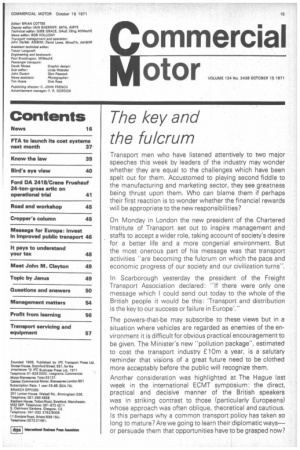The key and the fulcrum
Page 17

If you've noticed an error in this article please click here to report it so we can fix it.
Transport men who have listened attentively to two major speeches -this week by leaders of the industry may wonder whether they are equal to the challenges which have been spelt out for them, Accustomed to playing second fiddle to the manufacturing and marketing sector, they see greatness being thrust upon them. Who can blame them if perhaps their first reaction is to wonder whether the financial rewards will be appropriate to the new responsibilities?
On Monday in London the new president of the Chartered Institute of Transport set out to inspire management and staffs to accept a wider role, taking account of society's desire for a better life and a more congenial environment. But the most onerous part of his message was that transport activities "are becoming the fulcrum on which the pace and economic progress of our society and our civilization turns-.
In Scarborough yesterday the president of the Freight Transport Association declared: "If there were only one message which I could send out today to the whole of the British people it would be this: 'Transport and distribution is the key to our success or failure in Europe'."
The powers-that-be may subscribe to these views but in a situation where vehicles are regarded as enemies of the environment it is difficult for obvious practical encouragement to be given. The Minister's new "pollution package-, estimated to cost the transport industry E 1 Om a year, is a salutary reminder that visions of a great future need to be clothed more acceptably before the public will recognize them.
Another consideration was highlighted at The Hague last week in the international ECMT symposium: the direct, practical and decisive manner of the British speakers was n striking contrast to those (particularly Europeans) whose approach was often oblique, theoretical and cautious. Is this perhaps why a common transport policy has taken so long to mature? Are we going to learn their diplomatic ways— or persuade them that opportunities have to be grasped now?
















































































































